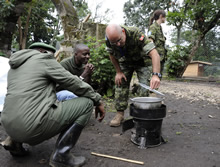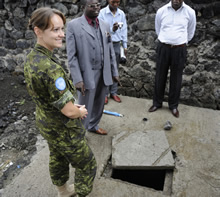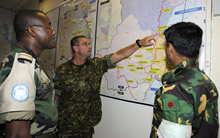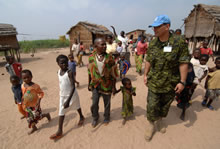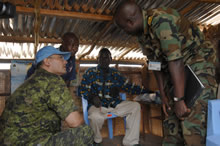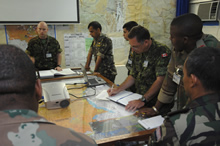Operation CROCODILE
Operation CROCODILE is Canada’s support to the United Nations Organization Stabilization Mission in the Democratic Republic of the Congo. This mission is known as Mission de l’Organisation des Nations Unies pour la stabilisation en République démocratique du Congo. Its acronym is MONUSCO.
How many people are deployed?
Currently, nine CAF members are deployed on Operation CROCODILE. They serve in two places in the Democratic Republic of Congo (DRC). The first place is the MONUSCO headquarters in Kinshasa, and the second is a headquarters in Goma.
What do they do?
These CAF members are experts in military operations, liaison, and training. They support the MONUSCO mandate, which includes:
- protecting civilians
- working with the local government and international agencies to help the Congolese government improve justice and security
- monitoring an arms ban
- providing logistic support to assist in national and local elections
History and context of the operation
As of May 2019, MONUSCO has uniformed personnel from 54 nations. MONUSCO adapts according to the environment in the DRC.
Canadian Armed Forces’ relationship with MONUSCO
The CAF provided troops for the United Nations Mission in the Democratic Republic of Congo (MONUC) and has continued to provide troops for MONUSCO.
Timeline of key events
- In 1997, the Second Congo War began. It started with a coup against President Mobutu Sese Seko. The state that had been Zaïre became the DRC under President Laurent Kabila.
- In 1999, the Lusaka Ceasefire Agreement was signed by the DRC, Angola, Namibia, Rwanda, Uganda, and Zimbabwe. It was the first major attempt to end the Second Congo War.
- On November 30, 1999, the United Nations Security Council (UNSC) established MONUC. With UNSC Resolution 1856 of December 22, 2008, it reached its peak of 22,016 total uniformed personnel.
- In 2006, assisting Congolese authorities organize and conduct local elections was added to the mandate.
- In May 2010, MONUC changed to MONUSCO after the environment in the DRC had changed.
Related links
International mission
Government of Canada
Page details
- Date modified:
